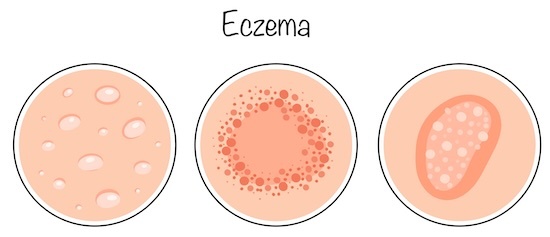Association Between Eczema and Molluscum Contagiosum
27th Jun 2025

Eczema significantly increases susceptibility to molluscum contagiosum (MC) due to skin barrier defects, while topical corticosteroids and immunomodulators can exacerbate MC by suppressing local immune responses. Infants with eczema are at higher risk of molluscum. Below is a detailed analysis based on clinical evidence.
- Increased Risk: Individuals with eczema have a 3.58 times higher likelihood of developing MC due to compromised skin barriers, which facilitate viral entry[1][2][3][4].
- Symptom Interaction: MC lesions often trigger eczema flares ("molluscum dermatitis") in surrounding skin, increasing itching and autoinoculation risk through scratching[5][6][3].
- Disease Severity: Children with eczema typically experience more numerous and persistent MC lesions, often distributed across larger body areas[6][3][4].
Impact of Topical Corticosteroids and Immunomodulators
- Worsening Infection:
- Topical steroids suppress cell-mediated immunity and antiviral cytokine production (e.g., TNF-α, IFN-γ), creating a favorable environment for MC proliferation[7][8][9].
- Immunomodulators like methotrexate or fingolimod further increase susceptibility to disseminated MC by impairing systemic immune responses[8].
- Relapse Risk:
Clinical Management Guidance
- Avoiding Harm:
- Alternative Treatments:
Key Recommendations
- Prevention: Address eczema flares promptly with barrier repair (e.g., emollients) to reduce MC risk[3][4]. Coconut oil is an effective barrier.
- Monitoring: Discontinue topical steroids if MC persists despite eczema improvement[9][12].
- First-Line MC Treatment: Natural resolution is preferred; if intervention is needed, use non-immunosuppressive options[1][14][12].
- Covering large molluscum with a hydocolloid patch is a first line approach to limit spread.[3]
Topical corticosteroids and immunomodulators require cautious use in eczema patients with MC due to their dual role in managing dermatitis while potentially exacerbating viral infections. Individualized treatment should balance eczema control and MC containment.
- https://www.webmd.com/skin-problems-and-treatments/eczema/eczema-and-molluscum-contagiosum
- https://journals.plos.org/plosone/article?id=10.1371%2Fjournal.pone.0103419
- https://www.mollenol.com/molluscum-home-treatment/
- https://dermnetnz.org/topics/molluscum-contagiosum
- https://pubmed.ncbi.nlm.nih.gov/22412023/
- https://jamanetwork.com/journals/jamadermatology/fullarticle/1351941
- https://dermnetnz.org/topics/topical-steroid
- https://pmc.ncbi.nlm.nih.gov/articles/PMC7369509/
- https://pmc.ncbi.nlm.nih.gov/articles/PMC11415223/
- https://pubmed.ncbi.nlm.nih.gov/21691050/
- https://pmc.ncbi.nlm.nih.gov/articles/PMC4684036/
- https://iusti.org/wp-content/uploads/2020/01/MolluscumContagiosumGuideline.pdf
- https://opendermatologyjournal.com/VOLUME/18/ELOCATOR/e18743722340545/PDF/
- https://evidence.nihr.ac.uk/alert/molluscum-contagiosum-is-best-left-to-clear-by-itself/
- https://www.mollenol.com/q-a/using-coconut-oil-for-eczema/
